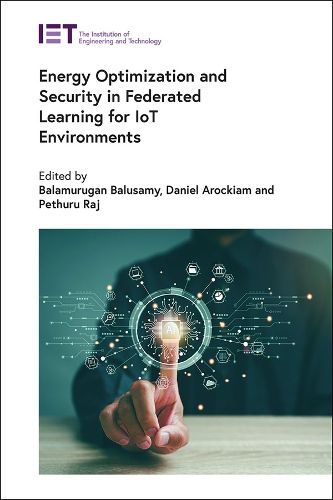Readings Newsletter
Become a Readings Member to make your shopping experience even easier.
Sign in or sign up for free!
You’re not far away from qualifying for FREE standard shipping within Australia
You’ve qualified for FREE standard shipping within Australia
The cart is loading…






Smart environments such as smart homes and industrial automation have been transformed by the rapid developments in internet of things (IoT) devices and systems. However, the widespread use of these devices poses significant difficulties, particularly in settings with limited energy resources. Due to the significant energy consumption and communication overhead associated with delivering huge amounts of data, traditional machine learning algorithms which rely on centralized cloud servers for training are not always suitable.
Federated learning is a decentralized strategy that enables collaborative machine learning model training while keeping the data local on edge devices. It has emerged as a suitable solution to overcome the energy constraints of IoT devices. Federated learning works by dividing the training process among several nodes and using the processing power of edge devices. As opposed to sending raw data to a central server, only the model changes are communicated thereby considerably lowering the communication costs while protecting data privacy. This strategy reduces energy usage while simultaneously reducing network latency and bandwidth-related problems.
In this book, the authors show how to optimise federated learning algorithms and develop new communication protocols and resource allocation methodologies to maximize energy savings while retaining respectable model accuracy, to develop long-lasting and scalable IoT solutions that can function independently with no dependency on an external cloud infrastructure.
Energy Optimization and Security in Federated Learning for IoT Environments is intended to be a useful resource for academic researchers, R&D professionals, IoT engineers in the IT industry, and data scientists creating optimised AI models to be run in cloud environments.
$9.00 standard shipping within Australia
FREE standard shipping within Australia for orders over $100.00
Express & International shipping calculated at checkout
Smart environments such as smart homes and industrial automation have been transformed by the rapid developments in internet of things (IoT) devices and systems. However, the widespread use of these devices poses significant difficulties, particularly in settings with limited energy resources. Due to the significant energy consumption and communication overhead associated with delivering huge amounts of data, traditional machine learning algorithms which rely on centralized cloud servers for training are not always suitable.
Federated learning is a decentralized strategy that enables collaborative machine learning model training while keeping the data local on edge devices. It has emerged as a suitable solution to overcome the energy constraints of IoT devices. Federated learning works by dividing the training process among several nodes and using the processing power of edge devices. As opposed to sending raw data to a central server, only the model changes are communicated thereby considerably lowering the communication costs while protecting data privacy. This strategy reduces energy usage while simultaneously reducing network latency and bandwidth-related problems.
In this book, the authors show how to optimise federated learning algorithms and develop new communication protocols and resource allocation methodologies to maximize energy savings while retaining respectable model accuracy, to develop long-lasting and scalable IoT solutions that can function independently with no dependency on an external cloud infrastructure.
Energy Optimization and Security in Federated Learning for IoT Environments is intended to be a useful resource for academic researchers, R&D professionals, IoT engineers in the IT industry, and data scientists creating optimised AI models to be run in cloud environments.